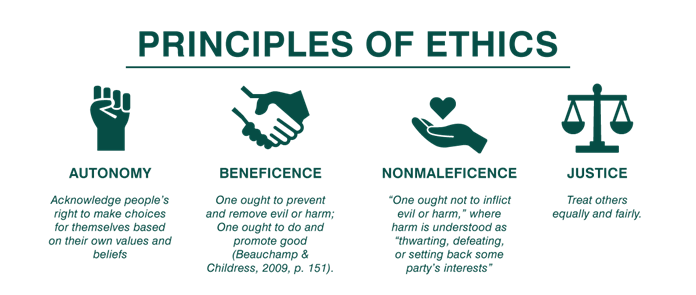Doing no harm is?
Justice
Nonmaleficence
Beneficence
Veracity
The Correct Answer is B
Nonmaleficence is the ethical principle of doing no harm. It requires healthcare providers to avoid causing harm to their patients and to take steps to prevent harm from occurring.
The other options are also important ethical principles in healthcare, but they do not specifically refer to doing no harm. Justice [a] refers to the fair distribution of benefits and burdens in society. Beneficence [c] refers to the obligation to do good and promote the well-being of others. Veracity [d] refers to the obligation, to tell the truth and not deceive others.

Nursing Test Bank
Naxlex Comprehensive Predictor Exams
Related Questions
Correct Answer is D
Explanation
The nurse should make the statement "I need to talk to you about unit expectations regarding timely completion of tasks" to resolve the conflict with the AP who has been taking long breaks and making personal phone calls. This statement is assertive and focuses on the issue at hand without blaming or attacking the AP. It also opens up a dialogue between the nurse and the AP to discuss the issue and find a resolution.
The other statements are not effective in resolving the conflict. Statements such as "Several staff members have commented that you don't do your fair share of the work" [a] and "You have been very inconsiderate of others by not completing your share of the work" [b] are accusatory and may make the AP defensive.
Threatening to inform the nurse manager [c] may also escalate the conflict and is not a constructive way to address the issue.
Correct Answer is ["A","D"]
Explanation
Addressing the situation as soon as possible [a] and assisting the provider in identifying alternative solutions [d] are actions that display conflict resolution. Conflict resolution involves finding a peaceful and mutually acceptable solution to a disagreement or dispute. By addressing the situation promptly and helping the provider to identify alternative solutions, the charge nurse can facilitate communication and collaboration between the provider and the staff nurse and help to resolve the conflict.
The other options do not display conflict resolution. Using aggressive communication skills [b] can escalate the conflict and make it more difficult to find a resolution. Fostering closed communication [c] can also hinder the resolution of the conflict by preventing open and honest dialogue between the parties involved.
Whether you are a student looking to ace your exams or a practicing nurse seeking to enhance your expertise , our nursing education contents will empower you with the confidence and competence to make a difference in the lives of patients and become a respected leader in the healthcare field.
Visit Naxlex, invest in your future and unlock endless possibilities with our unparalleled nursing education contents today
Report Wrong Answer on the Current Question
Do you disagree with the answer? If yes, what is your expected answer? Explain.
Kindly be descriptive with the issue you are facing.
